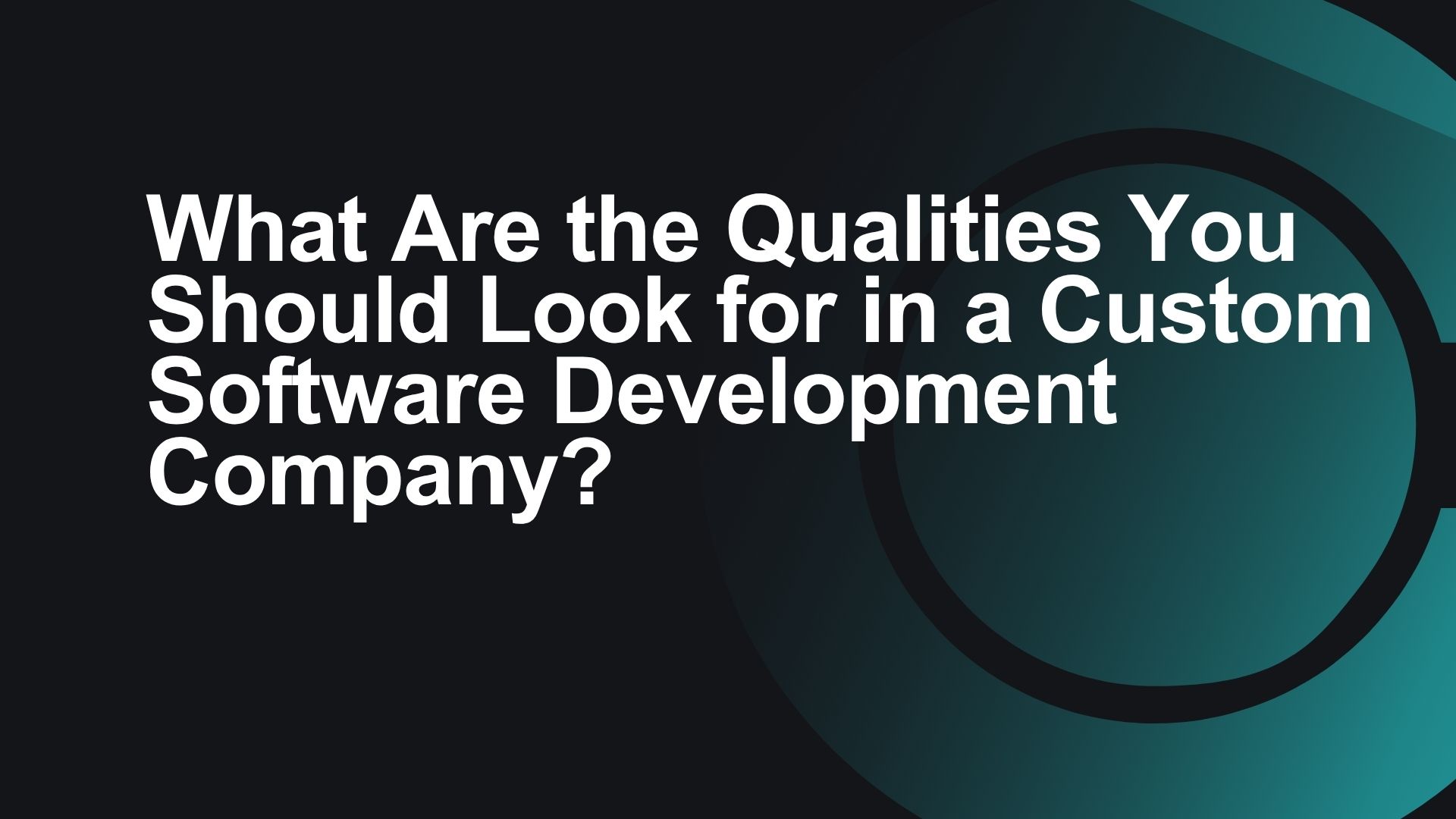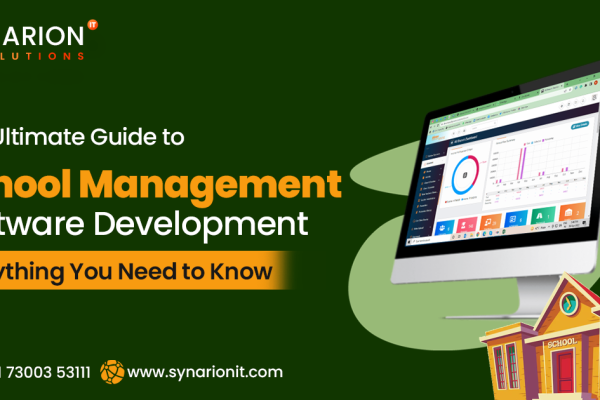Choosing the right custom software development partner can make or break your digital project. Whether you’re building a new web platform, a mobile app, or internal business software, aligning with a development team that understands your needs and goals is critical.
But how do you separate a competent team from an exceptional one?
In this blog, we’ll explore the top qualities you should look for in a custom software development company—and why these traits matter more than price or location alone.
1. Strong Technical Expertise
A development company should be proficient in the latest technologies, frameworks, and programming languages—across front-end, back-end, mobile, cloud, and databases. More importantly, they should know which tools are right for your project.
Look for:
-
Full-stack development capabilities
-
Cloud integration experience (AWS, Azure, GCP)
-
Familiarity with modern frameworks (React, Angular, Node.js, Laravel, Django, etc.)
-
Ability to build secure, scalable systems
✅ Tip: Ask for a tech stack recommendation and why they chose it.
2. Deep Understanding of Business Requirements
Great developers do more than write code—they understand the business logic behind the software. A top-tier company will work to understand your goals, customers, pain points, and industry before ever writing a line of code.
Look for:
-
Discovery workshops
-
Business analysts on the team
-
Requirements documentation
-
Proactive feature suggestions based on your goals
✅ Tip: The best teams ask questions about your users and your revenue model—not just your features.
3. Proven Portfolio and Case Studies
Experience matters. A company that has successfully delivered custom software across industries will be better equipped to anticipate challenges and deliver value.
Look for:
-
Case studies on past projects
-
Testimonials from clients
-
Demos or app walkthroughs
-
Relevance to your industry or project type
✅ Tip: Ask about lessons learned from past projects—they’ll tell you more than just the success stories.
4. Agile and Transparent Process
Software development can be unpredictable. The best companies use agile methodologies—breaking work into sprints, getting regular feedback, and adapting along the way.
Look for:
-
Clear sprint planning and task tracking
-
Weekly progress reports
-
Dedicated project manager
-
Transparency around challenges and timelines
✅ Tip: Ask how they handle changes in scope mid-project.
5. UI/UX Design Capabilities
Software is only successful if people want to use it. A great development partner also prioritizes user experience and interface design—ensuring that the product is intuitive, accessible, and beautiful.
Look for:
-
UI/UX design portfolios
-
Wireframing and prototyping stages
-
Usability testing
-
Knowledge of accessibility standards
✅ Tip: Ask if design and development teams work together or separately.
6. Post-Launch Support and Maintenance
Building the software is just step one. Updates, bug fixes, performance monitoring, and user support are critical after launch.
Look for:
-
Clear maintenance and SLA (Service Level Agreement) options
-
Support packages (monthly or hourly)
-
Bug resolution timelines
-
Performance monitoring tools
✅ Tip: Discuss what happens after deployment before you sign the initial contract.
7. Security and Compliance Knowledge
If your application handles sensitive data (like payments, personal information, or health records), security is non-negotiable. You need a partner who builds with privacy in mind and understands relevant regulations.
Look for:
-
Secure coding practices (e.g., OWASP guidelines)
-
Experience with data compliance laws (GDPR, HIPAA, POPIA)
-
Role-based access control (RBAC)
-
Data encryption protocols
✅ Tip: Ask how they conduct security testing before launch.
8. Cultural Fit and Communication
Success isn’t just about code—it’s also about collaboration. You want a team you feel comfortable working with over months (or years). A great software partner is responsive, proactive, and easy to communicate with.
Look for:
-
Dedicated point of contact (POC)
-
Weekly meetings or check-ins
-
Collaborative tools (Slack, Jira, Trello)
-
Fluency in your preferred language and time zone overlap
✅ Tip: Schedule a video call with the actual developers—not just the sales team.
9. Custom-Built vs. Template-Driven Solutions
Beware of companies that use one-size-fits-all templates. True custom software is built from the ground up based on your needs—not forced into a pre-existing mold.
Look for:
-
Architecture planning tailored to your goals
-
Reusable code when appropriate—but not at the cost of flexibility
-
Clear explanation of why their solution is custom
✅ Tip: Ask to see source code structure or Git repo samples.
10. Transparent Pricing Model
Custom software is an investment—but surprise costs and vague estimates can kill momentum. Choose a company that offers clear, phased pricing based on scope and value.
Look for:
-
Fixed-price options for MVPs
-
Time-and-materials billing for long-term work
-
Estimates broken into features or sprints
-
Contracts that reflect your rights to the IP
✅ Tip: Ask how they handle overruns or delays financially.
Conclusion
Finding the right custom software development company isn’t just about technical skill—it’s about finding a strategic partner who understands your vision, communicates openly, and builds solutions designed for growth and innovation.
If you’re planning a project and seeking reliable, forward-thinking talent, consider working with custom software developers South Africa has to offer—many of whom combine technical excellence with cost-effective, global service.
Frequently Asked Questions (FAQs)
1. How long does custom software development take?
It depends on the complexity. A basic MVP can take 8–12 weeks, while a full-featured enterprise platform may take 6+ months.
2. Is custom software more expensive than off-the-shelf solutions?
Yes—initially. But it delivers better ROI over time by aligning with your business needs and reducing licensing, workaround, and inefficiency costs.
3. What is the difference between bespoke and custom software?
They’re used interchangeably. Both refer to software specifically designed for your organization rather than general public use.
4. Do I own the code after the project ends?
Typically, yes—if your contract states so. Always clarify IP rights before you begin.
5. How do I start working with a custom software development company?
Start by identifying your business goals, setting a rough budget, and booking discovery sessions with potential vendors. A good partner will guide you from concept to launch.






